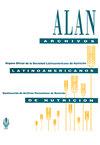人体测量指标对超重和肥胖的诊断价值
IF 0.3
4区 医学
Q4 NUTRITION & DIETETICS
引用次数: 0
摘要
肥胖的定义是脂肪量过多,然而,还有其他人体测量指标可用于诊断超重或肥胖;目标。确定身体质量指数(BMI)、腰围(WC)和体型指数(ABSI)对厄瓜多尔成年人群超重或肥胖的诊断准确性。材料和方法。进行了一项观察性横断面研究,253名年龄在20至60岁之间的受试者参与了该研究。测量体重、身高、腰围和体脂百分比。PBF与BMI、WC和ABSI相关,这些指标的敏感性和特异性是用ROC曲线诊断超重或肥胖的。后果男性的PBF低于女性(30.09 vs 41.87),男性的ABSI和CC分别高于女性(0.079 vs 0.075)和(99.76 vs 91.25)。体脂%与BMI和WC呈强正相关(≥0.75)。在ROC曲线上,观察到BMI最高曲线下的区域(0.949),而ABSI最低区域(0.395)。结论。BMI是超重或肥胖诊断精度最高的指标。ABSI不是诊断超重或肥胖的有用指标。本文章由计算机程序翻译,如有差异,请以英文原文为准。
Valor diagnóstico de indicadores antropométricos para sobrepeso y obesidad
Obesity is defined by an excess of fat mass, however, there are other anthropometric indicators that can be useful for the diagnosis of overweight or obesity; Objetive. To determine the diagnostic accuracy of the body mass index (BMI), waist circumference (WC) and body shape index (ABSI) for the diagnosis of overweight or obesity in an adult population of Ecuador. Materials and methods. An observational cross-sectional study was carried out in which 253 subjects aged between 20 and 60 years participated. Weight, height, waist circumference and percentage body fat (PBF) were measured. The PBF was correlated with BMI, WC and ABSI and the sensitivity and specificity of these indicators were established for the diagnosis of overweight or obesity with ROC curves. Results. The PBF was lower in men than in women (30.09 vs 41.87), ABSI and CC were higher in men than in women (0.079 vs 0.075) and (99.76 vs 91.25) respectively. A strong positive correlation (≥0.75) was found between % body fat and BMI and WC. On the ROC curve, the area under the highest curve is observed for BMI (0.949), while the lowest area is observed for ABSI (0.395). Conclusion. The BMI is the indicator with the highest diagnostic precision of overweight or obesity. ABSI would not be a useful indicator in the diagnosis of overweight or obesity.
求助全文
通过发布文献求助,成功后即可免费获取论文全文。
去求助
来源期刊
CiteScore
0.50
自引率
0.00%
发文量
31
期刊介绍:
Archivos Latinoamericanos de Nutrición (ALAN) is the official publication of the Sociedad Latinoamericana de Nutición (SLAN), for the dissemination of knowledge in the fields of food and nutrition, principally throughout the American Hemisphere. Articles in Spanish, English, Portuguese and French are accepted, both from the Society members and from nonmembers, in the following categories: 1. General articles (critical scientific reviews); 2. Research articles (originals); 3. Papers in applied nutrition (analytical results from intervention programs and discussion of reconmendations of practical application), and 4. Letters to Editor (short comments of general interest or about scientific facts and results previously published in Archives).

 求助内容:
求助内容: 应助结果提醒方式:
应助结果提醒方式:


